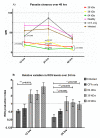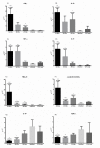A T-Cell Epitope-Based Multi-Epitope Vaccine Designed Using Human HLA Specific T Cell Epitopes Induces a Near-Sterile Immunity against Experimental Visceral Leishmaniasis in Hamsters
- PMID: 34696166
- PMCID: PMC8537199
- DOI: 10.3390/vaccines9101058
A T-Cell Epitope-Based Multi-Epitope Vaccine Designed Using Human HLA Specific T Cell Epitopes Induces a Near-Sterile Immunity against Experimental Visceral Leishmaniasis in Hamsters
Abstract
Visceral leishmaniasis is a neglected tropical disease affecting 12 million people annually. Even in the second decade of the 21st century, it has remained without an effective vaccine for human use. In the current study, we designed three multiepitope vaccine candidates by the selection of multiple IFN-γ inducing MHC-I and MHC-II binder T-cell specific epitopes from three previously identified antigen genes of Leishmania donovani from our lab by an immuno-informatic approach using IFNepitope, the Immune Epitope Database (IEDB) T cell epitope identification tools, NET-MHC-1, and NET MHC-2 webservers. We tested the protective potential of these three multiepitope proteins as a vaccine in a hamster model of visceral leishmaniasis. The immunization data revealed that the vaccine candidates induced a very high level of Th1 biased protective immune response in-vivo in a hamster model of experimental visceral leishmaniasis, with one of the candidates inducing a near-sterile immunity. The vaccinated animals displayed highly activated monocyte macrophages with the capability of clearing intracellular parasites due to increased respiratory burst. Additionally, these proteins induced activation of polyfunctional T cells secreting INF-γ, TNF-α, and IL-2 in an ex-vivo stimulation of human peripheral blood mononuclear cells, further supporting the protective nature of the designed candidates.
Keywords: IFN-γ epitope; Leishmania; T cell; epitopes; hamster; sterile immunity; vaccine.
Conflict of interest statement
The authors declare no conflict of interest.
Figures






References
-
- WHO|Weekly Epidemiological Record. [(accessed on 19 November 2020)];2017 September 22;Volume 92:557–572. Available online: http://www.who.int/wer/2017/wer9238/en/
-
- Medina-Colorado A.A., Osorio E.Y., Saldarriaga O.A., Travi B.L., Kong F., Spratt H., Soong L., Melby P.C. Splenic CD4+ T Cells in Progressive Visceral Leishmaniasis Show a Mixed Effector-Regulatory Phenotype and Impair Macrophage Effector Function through Inhibitory Receptor Expression. PLoS ONE. 2017;12:e0169496. doi: 10.1371/journal.pone.0169496. - DOI - PMC - PubMed
Grants and funding
LinkOut - more resources
Full Text Sources
Research Materials
Miscellaneous

